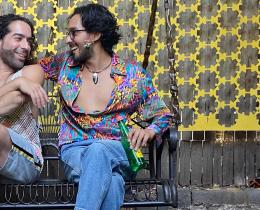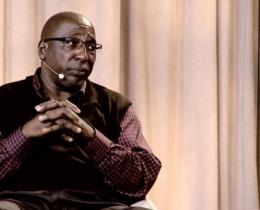Omega: Why do you think it’s so difficult for us to talk about sex?
Cyndi: I’m very interested in why sex is still such a taboo topic. Sex, sexuality, and connection are part of the human condition. Yet no other aspect of the human condition is as heavily policed or moralized or suppressed as sex and sexuality.
It’s possible that some of our reservations are from historical and religious regulations, but even people who don’t identify as religious feel an almost crippling shame and morality around sex. This stops people from talking about it or enjoying it. It stops people from being able to enjoy their bodies.
Omega: How can we begin to dismantle the taboo around this topic?
Cyndi: Much like we learn how nutrition and exercise can work for us, we have to learn how to engage with sexuality for it to be rewarding. To do this we need more information and education. And if we’re going to teach sexuality, we have to teach emotional communication. We currently don’t teach either one, but the two go hand in hand.
We have this idea that when you turn 18, suddenly information is downloaded into your head about how to be an adult. That’s rubbish! Meanwhile, there are all these adults walking around thinking, "Why don't I know this? Why aren't I amazing at sex and relationships?" When I ask them where they learned about sex, it dawns on them that they never actually did learn about sex.
Omega: Why is it important to talk about sex?
Cyndi: Sex is much more than just the physical. It engages our bodies, our minds, and in some cases our hearts. For some folks it engages their soul and spirit. It touches so many areas of our life that being able to talk about it means that whatever interaction you’re going to have—whether it be a one-night stand or a long-term intimate relationship—will be based on a mutual understanding.
A lot of people have sex on autopilot. They don't know why they're there. They're just going through the motions and hoping for the best. And the reason that happens is because we have not been given permission or the vocabulary with which to talk about it. When we don't talk about it, we feel silenced, shut down, ashamed, blocked, and trapped. We worry we’ll hurt someone’s feelings if we say anything or that we’ll feel awkward or our partner will want a divorce. It doesn’t have to be this way. We can get more comfortable talking about sex and complex emotions.
Omega: It sounds like being vulnerable is an important part of changing this dynamic.
Cyndi: I'm impressed by the work of people like Brené Brown. She talks about complex emotions so beautifully. She does it in such a way that helps people understand that everybody feels vulnerable and everybody feels shame and everybody feels a bit icky some of the time. And you know what? We are all still here. It's going to be okay. I want to extend that conversation to include human sexuality. I want people to seek out therapy not because they feel broken, but because they’re inquisitive and curious and want more information so they can experience something more fulfilling than what they currently have.
Omega: How does shame affect our sexuality and how can we reduce its effects?
Cyndi: Shame is something that is placed upon us through social filters and can only be addressed through the practice of being seen. I don't mean on a vast public scale, but being able to at least practice talking about it with your partner is a good thing. Change begins at the micro-level.
Once you can talk about it in your own home, maybe you give yourself permission to talk about it with your neighbors or friends. I don’t mean the nitty gritty side of it, but approaching it as if you were sharing recipes. As you talk about it, you eliminate the shame around it by developing resiliency. To be able to stand up and say, at least to your partner, "I love you. Sex is important to me. Sex is important for our relationship, and I would like for us to be able to have conversations about this to help our relationship get stronger” is a powerful act of resistance against shame.
Omega: When do you think we should start talking to kids about sexuality?
Cyndi: One of the myths around sexuality is that kids learn about sex when they hit puberty. They don't. You start learning about sex from the moment you’re born. The first question people ask is, "What gender is it?" And based on what's between your legs, you get brought up with a particular set of values. You get taught how to walk, how to talk, how to dress, what you can wear, what you can't wear, what kind of language to use, and frankly, what privileges you have. That influences how you start to relate to your body and other people’s bodies.
All of this informs how we relate to sex and pleasure. If we have grown up in a body that we feel is less than or inadequate in some way—not big enough, not small enough, not pretty enough—we may question whether we’re allowed to take up space on the planet or whether we’re worthy of affection.
We learn about sex constantly, until we hit the grave. The idea that sex education is something separate that you learn at school is ridiculous. Sex education is a community response. It's happening constantly, whether we like it or not. We need to make it more explicit—and I don’t mean explicit like porn, I mean clear and robust— because it’s happening everywhere. It’s in pop music, advertising, films, on the internet, on the back of a bus. It’s everywhere, and yet we can’t talk about it.
Omega: What do you wish somebody had told you about sex when you were young?
Cyndi: I wish someone had told me that everybody feels a bit weird about sex. That everybody feels a bit uncomfortable and unsure and that finding somebody to talk to about it is a helpful and good thing to do.
Omega: What is one thing someone could do today to start to embrace their sexuality?
Cyndi: They can give themselves permission to do so. That's it. You can literally say it out loud or write yourself a permission slip. Talk with someone important to you or put it on Twitter. The possibilities are endless, but the main thing is that there’s an internal recognition that you are going to let yourself embrace your sexuality.



